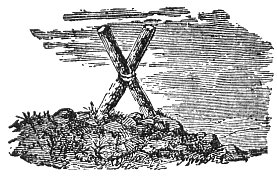p. 558
[paragraph continues] But these ideas transcend his limited essence; he cannot understand them; he is merely their unconscious organ; and therefore is unable himself to comprehend the whole scope and meaning of the work which he performs. As an organ under the guidance of a higher inspiration, he reveals higher truths than he himself can comprehend. The mass of the Jews, they held, recognized not the angel, by whom, in all the Theophanies of the Old Testament, God revealed Himself; they knew not the Demiurge in his true relation to the hidden Supreme God, who never reveals Himself in the sensible world. They confounded the type and the archetype, the symbol and the idea. They rose no higher than the Demiurge; they took him to be the Supreme God Himself. But the spiritual men among them, on the contrary, clearly perceived, or at least divined, the ideas veiled under Judaism; they rose beyond the Demiurge, to a knowledge of the Supreme God; and are therefore properly His worshippers [θεραπευταί . . Therapeutai].
Other Gnostics, who had not been followers of the Mosaic religion, but who had, at an earlier period, framed to themselves an oriental Gnosis, regarded the Demiurge as a being absolutely hostile to the Supreme God. He and his angels, notwithstanding their finite nature, wish to establish their independence: they will tolerate no foreign rule within their realm. Whatever of a higher nature descends into their kingdom, they seek to hold imprisoned there, lest it should raise itself above their narrow precincts. Probably, in this system, the kingdom of the Demiurgic Angels corresponded, for the most part, with that of the deceitful Star-Spirits, who seek to rob man of his freedom, to beguile him by various arts of deception, and who exercise a tyrannical sway over the things of this world. Accordingly, in the system of these Sabæans, the seven Planet-Spirits, and the twelve Star-Spirits of the zodiac, who sprang from an irregular connection between the cheated Fetahil and the Spirit of Darkness, play an important part in everything that is bad. The Demiurge is a limited and limiting being, proud, jealous, and revengeful; and this his character betrays itself in the Old Testament, which, the Gnostics held, came from him. They transferred to the Demiurge himself, whatever in the idea of God, as presented by the Old Testament, appeared to them defective. Against his will and rule the ὕλη was continually rebelling, revolting without control against the dominion which he, the fashioner, would exercise over it,
p. 559
casting off the yoke imposed on it, and destroying the work he had begun. The same jealous being, limited in his power, ruling with despotic sway, they imagined they saw in nature. He strives to check the germination of the divine seeds of life which the Supreme God of Holiness and Love, who has no connection whatever with the sensible world, has scattered among men. That perfect God was at most known and worshipped in Mysteries by a few spiritual men.
The Gospel of St. John is in great measure a polemic against the Gnostics, whose different sects, to solve the great problems, the creation of a material world by an immaterial Being, the fall of man, the incarnation, the redemption and restoration of the spirits called men, admitted a long series of intelligences, intervening in a series of spiritual operations; and which they designated by the names, The Beginning, the Word, the Only-Begotten, Life, Light, and Spirit [Ghost]: in Greek, Ἀρκή, Λόγος, Μονογενής, Ζωή, Φῶςand Πνευμα [Arche_, Logos, Monogene_s, Zo_e, Pho_s, and Pneuma]. St. John, at the beginning of his Gospel, avers that it was Jesus Christ who existed in the Beginning; that He was the WORD of God by which everything was made; that He was the Only-Begotten, the Life and the Light, and that He diffuses among men the Holy Spirit [or Ghost], the Divine Life and Light.
So the Ple_roma [Πλήρωμα], Plenitude or Fullness, was a favorite term with the Gnostics, and Truth and Grace were the Gnostic Eons; and the Simonians, Doke_te_s, and other Gnostics held that the Eon Christ Jesus was never really, but only apparently clothed with a human body: but St. John replies that the Word did really become Flesh, and dwelt among us; and that in Him were the Ple_roma and Truth and Grace.

Moe is the founder of GnosticWarrior.com. He is a father, husband, author, martial arts black belt, and an expert in Gnosticism, the occult, and esotericism.



![How the same King Oswald, asking a bishop of the Scottish nation, had Aidan sent him, and granted him an episcopal see in the Isle of Lindisfarne [635A.D.] | Book 3 | Chapter 3 How the same King Oswald, asking a bishop of the Scottish nation, had Aidan sent him, and granted him an episcopal see in the Isle of Lindisfarne [635A.D.] | Book 3 | Chapter 3](https://www.gnosticwarrior.com/wp-content/plugins/contextual-related-posts/default.png)


